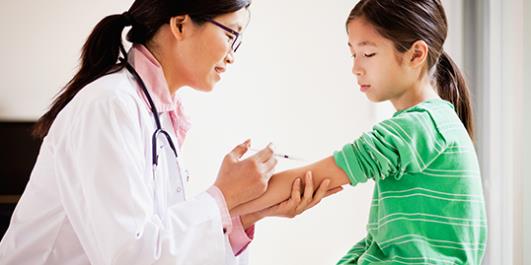Does my twelve year old need the HPV vaccine already?
The HPV vaccine offers the best protection before kids become sexually active
By Sally Wadyka Jul 22, 2013
Turn to MSN's Ask A Doctor blog every day to find answers from top experts to all of your health concerns. Have a health issue or just curious? Send in your question today.
Most pediatricians offer this vaccine to boys and girls around 11 or 12 years old. “We suggest it be given with the rest of the middle school vaccines,” says pediatrician Natasha Burgert.

As for the common argument that their kid isn’t having sex yet so why do they need a vaccine against a sexually transmitted disease, Burgert tells parents that this is actually the perfect time to get vaccinated. “Once they are exposed to HPV, we have no way to protect them from it,” she says. And since about 50 percent of women ages 14 to 60 are infected with HPV, there’s a good chance your son or daughter will eventually be exposed. Contracting HPV can not only cause genital warts and lead to a higher risk of cervical cancer in women, it can also cause cancer of the tongue, tonsils or throat (like Michael Douglas) in both men and women. A new study found that the vaccine provided 93 percent protection against the two types of HPV that cause most cancers.
According to Burgert, your body develops the most HPV-fighting antibodies when the vaccine is given at about age twelve. “The effects of the vaccine decrease if you get when you’re older,” she says. “So if you plan on your child getting it, there’s absolutely no reason to delay.”
Dr. Natasha Burgert is a Board-Certified pediatrician who practices general pediatrics in Kansas City, MO. She regularly shares her passion for science-based child health and confident parenting on her web site.
Most pediatricians offer this vaccine to boys and girls around 11 or 12 years old. “We suggest it be given with the rest of the middle school vaccines,” says pediatrician Natasha Burgert.

As for the common argument that their kid isn’t having sex yet so why do they need a vaccine against a sexually transmitted disease, Burgert tells parents that this is actually the perfect time to get vaccinated. “Once they are exposed to HPV, we have no way to protect them from it,” she says. And since about 50 percent of women ages 14 to 60 are infected with HPV, there’s a good chance your son or daughter will eventually be exposed. Contracting HPV can not only cause genital warts and lead to a higher risk of cervical cancer in women, it can also cause cancer of the tongue, tonsils or throat (like Michael Douglas) in both men and women. A new study found that the vaccine provided 93 percent protection against the two types of HPV that cause most cancers.
According to Burgert, your body develops the most HPV-fighting antibodies when the vaccine is given at about age twelve. “The effects of the vaccine decrease if you get when you’re older,” she says. “So if you plan on your child getting it, there’s absolutely no reason to delay.”
Dr. Natasha Burgert is a Board-Certified pediatrician who practices general pediatrics in Kansas City, MO. She regularly shares her passion for science-based child health and confident parenting on her web site.
No comments:
Post a Comment